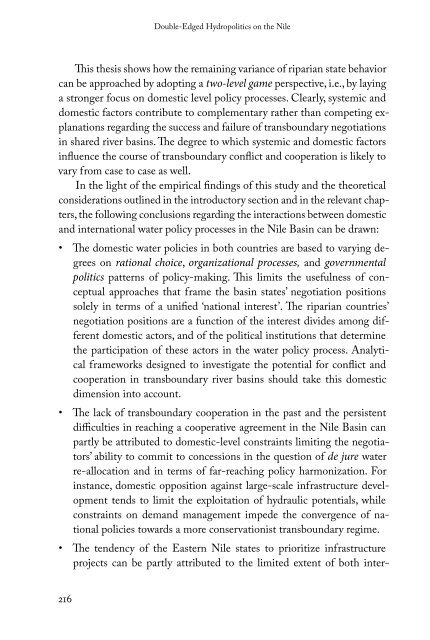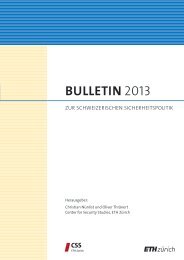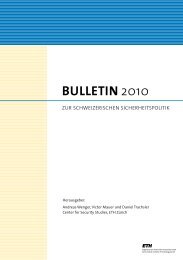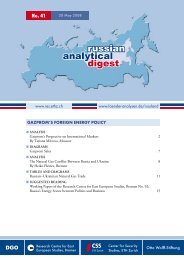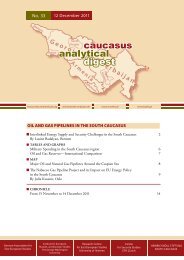Double-Edged Hydropolitics on the Nile - Center for Security Studies ...
Double-Edged Hydropolitics on the Nile - Center for Security Studies ...
Double-Edged Hydropolitics on the Nile - Center for Security Studies ...
Create successful ePaper yourself
Turn your PDF publications into a flip-book with our unique Google optimized e-Paper software.
<str<strong>on</strong>g>Double</str<strong>on</strong>g>-<str<strong>on</strong>g>Edged</str<strong>on</strong>g> <str<strong>on</strong>g>Hydropolitics</str<strong>on</strong>g> <strong>on</strong> <strong>the</strong> <strong>Nile</strong><br />
This <strong>the</strong>sis shows how <strong>the</strong> remaining variance of riparian state behavior<br />
can be approached by adopting a two-level game perspective, i.e., by laying<br />
a str<strong>on</strong>ger focus <strong>on</strong> domestic level policy processes. Clearly, systemic and<br />
domestic factors c<strong>on</strong>tribute to complementary ra<strong>the</strong>r than competing explanati<strong>on</strong>s<br />
regarding <strong>the</strong> success and failure of transboundary negotiati<strong>on</strong>s<br />
in shared river basins. The degree to which systemic and domestic factors<br />
influence <strong>the</strong> course of transboundary c<strong>on</strong>flict and cooperati<strong>on</strong> is likely to<br />
vary from case to case as well.<br />
In <strong>the</strong> light of <strong>the</strong> empirical findings of this study and <strong>the</strong> <strong>the</strong>oretical<br />
c<strong>on</strong>siderati<strong>on</strong>s outlined in <strong>the</strong> introductory secti<strong>on</strong> and in <strong>the</strong> relevant chapters,<br />
<strong>the</strong> following c<strong>on</strong>clusi<strong>on</strong>s regarding <strong>the</strong> interacti<strong>on</strong>s between domestic<br />
and internati<strong>on</strong>al water policy processes in <strong>the</strong> <strong>Nile</strong> Basin can be drawn:<br />
• The domestic water policies in both countries are based to varying degrees<br />
<strong>on</strong> rati<strong>on</strong>al choice, organizati<strong>on</strong>al processes, and governmental<br />
politics patterns of policy-making. This limits <strong>the</strong> usefulness of c<strong>on</strong>ceptual<br />
approaches that frame <strong>the</strong> basin states’ negotiati<strong>on</strong> positi<strong>on</strong>s<br />
solely in terms of a unified ‘nati<strong>on</strong>al interest’. The riparian countries’<br />
negotiati<strong>on</strong> positi<strong>on</strong>s are a functi<strong>on</strong> of <strong>the</strong> interest divides am<strong>on</strong>g different<br />
domestic actors, and of <strong>the</strong> political instituti<strong>on</strong>s that determine<br />
<strong>the</strong> participati<strong>on</strong> of <strong>the</strong>se actors in <strong>the</strong> water policy process. Analytical<br />
frameworks designed to investigate <strong>the</strong> potential <strong>for</strong> c<strong>on</strong>flict and<br />
cooperati<strong>on</strong> in transboundary river basins should take this domestic<br />
dimensi<strong>on</strong> into account.<br />
• The lack of transboundary cooperati<strong>on</strong> in <strong>the</strong> past and <strong>the</strong> persistent<br />
difficulties in reaching a cooperative agreement in <strong>the</strong> <strong>Nile</strong> Basin can<br />
partly be attributed to domestic-level c<strong>on</strong>straints limiting <strong>the</strong> negotiators’<br />
ability to commit to c<strong>on</strong>cessi<strong>on</strong>s in <strong>the</strong> questi<strong>on</strong> of de jure water<br />
re-allocati<strong>on</strong> and in terms of far-reaching policy harm<strong>on</strong>izati<strong>on</strong>. For<br />
instance, domestic oppositi<strong>on</strong> against large-scale infrastructure development<br />
tends to limit <strong>the</strong> exploitati<strong>on</strong> of hydraulic potentials, while<br />
c<strong>on</strong>straints <strong>on</strong> demand management impede <strong>the</strong> c<strong>on</strong>vergence of nati<strong>on</strong>al<br />
policies towards a more c<strong>on</strong>servati<strong>on</strong>ist transboundary regime.<br />
• The tendency of <strong>the</strong> Eastern <strong>Nile</strong> states to prioritize infrastructure<br />
projects can be partly attributed to <strong>the</strong> limited extent of both inter-<br />
216


